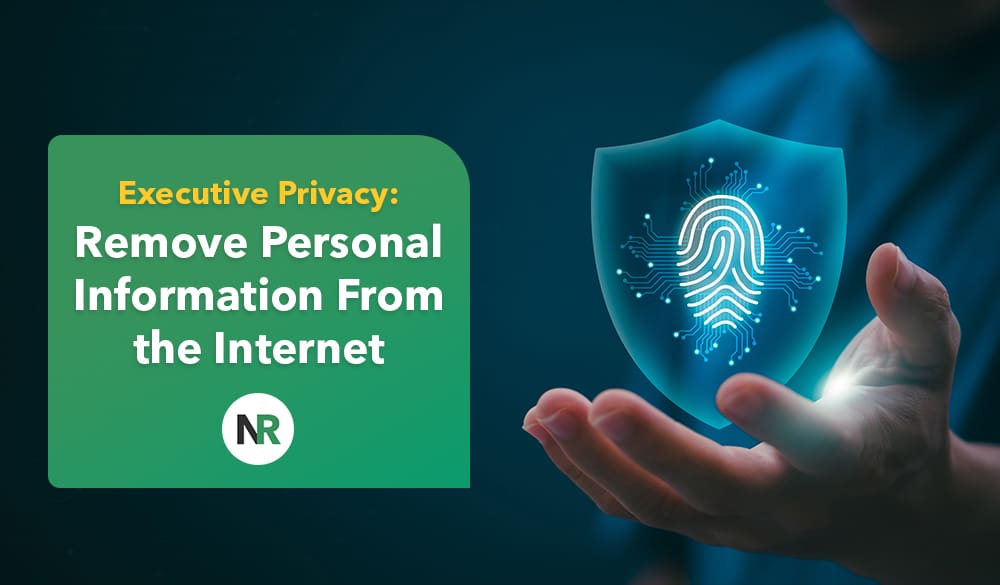Why is executive privacy such a pressing issue? The threat of identity fraud increases every day, especially for high-profile individuals. This is because hackers and threat actors are growing more sophisticated and successful in their efforts to steal your personal information.
In 2023, more than 880,400 internet scam complaints were received, resulting in $12.5 billion in losses. Phishing, personal data breaches, extortion and identity theft fall within the top 8 types of internet crimes reported. Moreover, impersonation scams are trending upward.
Your personal information and sensitive data are all over the internet. Once hackers acquire your information, it’s only a matter of time before they’ll start using your credit cards, making online threats and more.
The good news is that you can have your information purged from the internet. Read on to learn all about digital executive protection and explore threat intelligence solutions that result in the removal of personal data from the internet.
NetReputation provides digital executive protection information and services to help you protect your digital footprint. Call us at 844-461-3632 to learn more, or fill out the contact form below for a free consultation.
Request a Free Consultation
What Is Executive Privacy?
Executive privacy is a process that involves removing a VIP’s personal information from the internet. Executives and VIPs are commonly targeted by hackers. They attract hackers because they have so much to lose, which means hackers have a lot to gain.
Typically, corporate executives and VIPs earn a high salary and have more assets than the average person. In many cases, they have access to a company’s assets, too. This makes them an even more valuable target. In addition to gaining access to financials, hackers often want to destroy an executive’s prominent reputation. Sometimes, destroying the reputation of a VIP is the biggest thrill and accomplishment of all.
Because executives frequently make tough decisions, they have the potential to make more enemies and deal with disgruntled employees. It is becoming increasingly common to see a former employee attempt to tarnish his or her boss’s reputation in an online format. This means that executives are no longer under the protection of office security. Cybercriminals do not need a security badge for access to executives.
Worst of all, the scariest scenario takes place in the real world. With personal information like home addresses easily available online, disgruntled employees can show up at a person’s home to threaten them.
How Digital Executive Protection Services Help
An executive privacy service searches for websites that collect your personal information. This is referred to as a full online information audit. Any site that collects, displays, or repackages your data is included in this search. Background check websites, people search sites and data brokers are common sources that acquire and publish an executive’s information.
Next, the executive privacy service will purge this information from the web. This includes removing personal data such as phone numbers, home addresses, and date of birth from people search sites and similar online sources. The online reputation management company may also remove your family members’ information.
Another critical element of executive privacy is constant monitoring of the internet. Just because your identity is secure today does not mean it will be tomorrow. A high-quality executive privacy company will ensure that your information does not become available in the future.
At NetReputation, we work with business professionals in need of executive protection. Give us a call at 844-461-3632 to learn more about our identity protection and personal data removal services.
What Type of Information Is Available Online for High-Profile Executives?
Your personal data is littered all over the internet. Every time you make an online payment, your sensitive financial information is available to hackers. Plus, you enter your shipping and billing address whenever you place an order. You give up your online privacy in your daily life, which gives data brokers a lot of access to your sensitive information.
Your credit card and checking account information is likely out there. And think about the information you make available on your social media accounts. On Facebook, for example, everyone enjoys receiving birthday wishes from all of their friends and family.
Hackers, identity thieves and data brokers love this because you are publicly revealing sensitive personal information. To them, your date of birth is a major piece of the puzzle in stealing your identity.
The bad guys are also able to piece together answers to your security questions through social media. One of the top security questions is, “What is your mother’s maiden name?” Fortunately for the hackers, Facebook lists your family members, and some users even put their maiden name in parentheses.
High-Profile Executives Leave an Even Bigger Digital Trail
In addition to the type of digital footprint that practically everyone leaves behind, high-profile individuals have to be even more aware of the business and personal data they leave behind online:
- Company Bios and LinkedIn: Content on company websites and professional social media accounts can include your board memberships, business affiliations and career history.
- Conference Appearances: When board members and other high-value targets attend conferences, event agendas and video recordings are easily accessible.
- Donations and Philanthropy: The charity boards you’re part of, as well as foundation websites and political contributions, can give away financial and wealth information.
- Interviews and Press Releases: Your images, opinions and quotes can be found in interviews, press releases and similar media and materials.
The professional footprint of high-value targets can reveal travel and location details, schedules and routines, financial information and more. This can lead to personal privacy breaches, cyber attacks and even physical threats.
Are High-Value Targets Really at Risk?
Many people falsely assume identity fraud cannot happen to them. They believe that the odds are astronomically low of it occurring and that they’re safe in terms of online privacy. This could not be farther from the truth, especially for executives.
In a single year, there were nearly 680,000 account takeovers. New account fraud is reaching epic proportions. This occurs when a hacker or identity thief opens up a credit card, loan or even a mortgage using your personal information. Today, almost every tool in the cybercriminal arsenal is being used more frequently.
Cyber attacks and online threats are on the rise, with hackers targeting routers, cameras, supply chains, and more. Formjacking is up, too, with thousands of websites compromised every year.
Cyber Threats Go Beyond Financial Motivations
Powerful executives and public figures aren’t just at risk financially. Authoritative positions and access to sensitive company data make them ideal for targeted attacks that damage their reputation or put their families at risk. Beyond committing financial fraud, targeted attacks can also result in an executive being discredited, the erosion of investor confidence, or a PR crisis.
With both your business life and your personal life at risk, a full-scale digital executive protection strategy is necessary. That includes protecting an executive’s home network with personal cybersecurity solutions, monitoring personal devices for potential breaches, and prioritizing physical security to keep everyone in the household safe.
Who Is Most Vulnerable to an Attack?
While everyone is vulnerable to identity fraud, some demographics are more at risk than others. For example, your recently deceased loved ones are at a heightened risk. The identities of millions of deceased individuals are stolen each year. This criminal activity is referred to as ghosting.
Even children are at risk of identity theft. Hackers and identity thieves love stealing a child’s social security number because it provides them with a clean slate. Children don’t have a credit history, and very few parents are monitoring their child’s Social Security number.
Enlisted military members are common victims, too. They are deployed to other parts of the world, so they are less likely to receive calls from debt collectors or catch suspicious behavior on their credit reports.
Also, the elderly are common victims of online scams and hacking attempts. The elderly are not as tech-savvy as younger generations. As a group, they routinely fall for phishing schemes and other predatory online behavior.
It’s important to know this because executive protection often considers the executive’s loved ones, too. Knowing the family members and friends who may be at the highest risk helps professionals create a digital executive protection strategy that considers all areas of the client’s life.
Executive Privacy and Online Reputation Management
The purpose of safeguarding an executive’s sensitive personal information goes beyond the basics of preventing identity theft. Yes, even VIPs deserve personal space and to feel like their private information is safe. On top of that, though, it’s also necessary to protect an individual’s and brand’s online reputation.
Bad actors sometimes care about tarnishing a VIP’s personal life as much as or more than they want to find phone numbers or credit card information. Being under the spotlight professionally shouldn’t automatically put an executive in an unsafe position, though.
When executive privacy erodes, a person’s or company’s reputation can be damaged, too. Executives and other VIPs have to proactively protect not just their online privacy but also their online reputation so the public perception aligns with their responsibilities, expectations and goals.
Online threats to executives are real and growing. Today, it’s far too eash for hackers and other bad actors to acquire your personal information on the web.
If you’re in need of executive privacy solutions or other online privacy services, contact us today to speak with a specialist. You can also fill out the form below.




